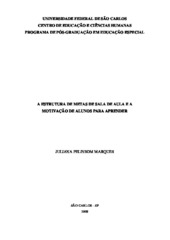| dc.contributor.author | Marques, Juliana Pelinsom | |
| dc.date.accessioned | 2016-06-02T19:46:02Z | |
| dc.date.available | 2009-07-14 | |
| dc.date.available | 2016-06-02T19:46:02Z | |
| dc.date.issued | 2009-02-17 | |
| dc.identifier.citation | MARQUES, Juliana Pelinsom. A estrutura de metas de sala de aula e a motivação de alunos para aprender. 2009. 97 f. Dissertação (Mestrado em Ciências Humanas) - Universidade Federal de São Carlos, São Paulo, 2009. | por |
| dc.identifier.uri | https://repositorio.ufscar.br/handle/ufscar/3000 | |
| dc.description.abstract | The study evaluates the motivation of students from elementary school on the basis of the achievement goals adopted and the classroom goal structure from the students perceptions and teachers descriptions of educational practices. The participants were 106 students from seventh and eighth grade (brazilian educational system), a Spanish Language, an Arts and a Health and Life Quality teachers. The
students personal goals were evaluated by the Scale of Evaluation of the Motivation to Learning. The educational practices were described from the Scale of the Classroom
Goal Structure filled by the students and from the answers provided by the teachers in an interview. The percentages of the students from the classes 1, 2, 3 and 4, who adopted adaptive patterns of achievement goal were, respectively, 19,2%, 36,0%, 29,4% e 20,0%; the percentages of students who adopted non-adaptive patterns were 46,2%, 44,0%, 52,9% e 45,0%. The students from Class 1 agreed partially that the tasks given by the teachers were motivating and the evaluation by the domain; students from other classes partially disagreed. The teachers described the use of diversified activities and the evaluation based on different procedures. It is concluded that the educational practices, even if they present some positive aspects, do not have the basic characteristics of the practices associated with the promotion of motivation to learn. It is discussed the contributions of the Achievement Goal Theory for the understanding of the motivation at school. | eng |
| dc.description.sponsorship | Financiadora de Estudos e Projetos | |
| dc.format | application/pdf | por |
| dc.language | por | por |
| dc.publisher | Universidade Federal de São Carlos | por |
| dc.rights | Acesso Aberto | por |
| dc.subject | Motivação na educação | por |
| dc.subject | Práticas educativas | por |
| dc.subject | Rendimento escolar | por |
| dc.subject | Estrutura de meta de sala de aula | por |
| dc.subject | Motivação de alunos | por |
| dc.subject | Metas de realização | por |
| dc.subject | Students motivation | eng |
| dc.subject | Achievement goal | eng |
| dc.subject | Classroom goal structure | eng |
| dc.title | A estrutura de metas de sala de aula e a motivação de alunos para aprender | por |
| dc.type | Dissertação | por |
| dc.contributor.advisor1 | Rose, Tânia Maria Santana de | |
| dc.contributor.advisor1Lattes | http://genos.cnpq.br:12010/dwlattes/owa/prc_imp_cv_int?f_cod=K4783679P5 | por |
| dc.description.resumo | O estudo avalia a motivação de alunos do Ensino Fundamental com base nas metas de realização adotadas e a estrutura de metas de sala de aula a partir das percepções dos alunos e de descrições dos professores sobre as práticas educativas. Os participantes foram 106 alunos de 7ª e 8ª séries e três professores de Espanhol, Artes e Saúde e Qualidade de Vida. As metas pessoais dos alunos foram avaliadas pela Escala de Avaliação da Motivação para Aprendizagem. As práticas educativas foram descritas a partir da Escala de Estrutura de Meta de Sala de Aula preenchida pelos alunos e das respostas fornecidas pelos professores em uma entrevista. As percentagens de alunos das turmas 1, 2, 3 e 4 que adotaram padrões adaptativos de metas de realização foram respectivamente 19,2%, 36%, 29,4% e 20%; as percentagens de alunos que adotaram padrões não adaptativos foram 46,2%, 44%, 52,9% e 45%. Os alunos da Turma 1 concordaram parcialmente que as tarefas dadas pelos professores eram motivantes e a avaliação pelo domínio; os alunos das demais turmas discordaram parcialmente. Os
professores descreveram uso de atividades diversificadas e avaliação baseada em diferentes procedimentos. Conclui-se que as práticas educativas ainda que apresentem alguns aspectos positivos, não contemplam as características básicas das práticas associadas à promoção da motivação para aprender. Discutem-se as contribuições da Teoria de Metas de Realização para entendimento da motivação na escola. | por |
| dc.publisher.country | BR | por |
| dc.publisher.initials | UFSCar | por |
| dc.publisher.program | Programa de Pós-Graduação em Educação Especial - PPGEEs | por |
| dc.subject.cnpq | CIENCIAS HUMANAS::EDUCACAO::TOPICOS ESPECIFICOS DE EDUCACAO::EDUCACAO ESPECIAL | por |
| dc.contributor.authorlattes | http://lattes.cnpq.br/3102126657724408 | por |
